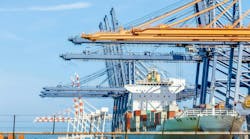Enjoying NFL football live at the stadium with a couple of cold beers is a tradition as old as the league itself. As such, one of the key elements to the infrastructure portion of a substantial upgrade to Land Shark Stadium (formerly Dolphin Stadium) in Miami Gardens, Fla., is a new stadium-wide storage and distribution system for draft beer. A series of vertical reciprocating conveyors (VRCs) from Pflow Industries is integral to the innovative new system.
Since the stadium opened in 1987, beer was transported with manual carts from beer trucks to storage coolers and, on game day, to the 40-plus beer kiosks around the stadium. Runners with the carts crisscrossed the stadium the entire game, changing out kegs while people waited in line. In 1993, the Florida Marlins began playing their 81-game spring and summer home baseball schedule at the stadium, increasing considerably the number of annual events and the volume of beer consumed.
From initial onsite delivery to ultimate sale, it was a labor-intensive, multi-step process that prevented the beer from being maintained at its optimum, chilled temperature. Upon delivery to the stadium, the beer was often exposed to the Florida heat until it could be stacked in various beer coolers. Beer that is re-chilled after warming often loses that crisp, freshly brewed taste and body. This phenomenon often occurred a second time as the beer was delivered from the coolers to the kiosks.
HOK Sport and Stiles Corp., the primary project architectural and construction firms, contracted with Trammell Equipment and Pflow to refine, construct and install the beer distribution enhancement. Trammell, a material handling and storage equipment company headquartered in Birmingham, Ala., and Pflow are long-time partners, having collaborated on a number of material handling projects in the southeastern region of the U.S.
The new system features four centralized beer refrigeration stations in four zones of the stadium, each with a piping network that delivers beer directly from the kegs to the individual taps in approximately 10 beer kiosks. Each of the stations is housed on a poured-in-place-concrete mezzanine, creating additional storage space within the existing footprint of the stadium while allowing trucks easy access to the coolers.
The kegs are delivered directly to each station where they are immediately stored.
Critical to the system is a Pflow Series-M VRC in each zone, providing quick vertical movement of the kegs from the trucks through an opening in the 16-foot elevated mezzanine that houses the coolers. The Pflow VRCs each have a 5-foot-by-5-foot carriage and a 4,000-pound capacity, allowing eight half-barrels on roller carts to be lifted at a time. The lift itself is secured to two cantilevered columns with the carriage off to the side for easy access.
“The key to the system is reliability and speed,” says Kevin Wright, regional sales manager for Trammell Equipment. “If any of the lifts are inoperable when the beer is delivered to the stadium, the system fails. We absolutely had to get a lifting mechanism with a lot of capacity that we knew would work all the time.”
Pflow engineers and Trammell collaborated with HOK and Stiles on some refinements to the system design, and once the project design was approved, it took less than two months for the mezzanine and lifts to be manufactured and installed.
For a sold-out Dolphins football game, each station typically handles 400 kegs, a startling total of 1,600 kegs. Kegs no longer need to be transported all around the stadium. They remain at optimum temperature in the cooler station from the time they are delivered to the stadium to the time they are consumed. After the game, the lifts return the empty kegs to the ground level where they are reloaded on trucks and returned.
“Our lifts are used in a variety of ways by a number of industries,” says Chuck Cobb, Pflow southeast regional manager. “What's unique about the Dolphin stadium project is how important the lifts are to making the new beer delivery structure viable in the limited space that was available. I've heard that the system is a prototype for other stadiums.”
The system has been in place for just over one season, and the lifts have delivered as well as or better than expected. Beer arrives at the stadium fresh and cold and stays that way until it flows from the taps.
Alex Miller is president of the AE Miller Marketing Group in Thiensville, Wis.


